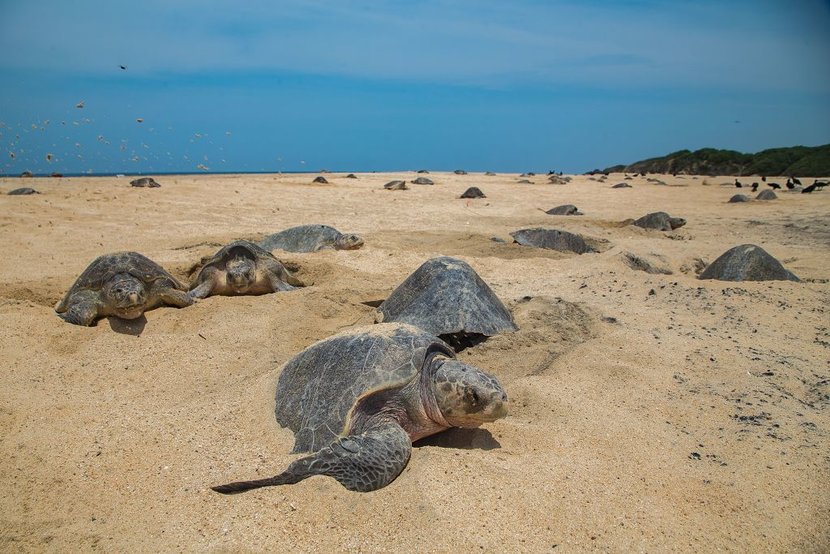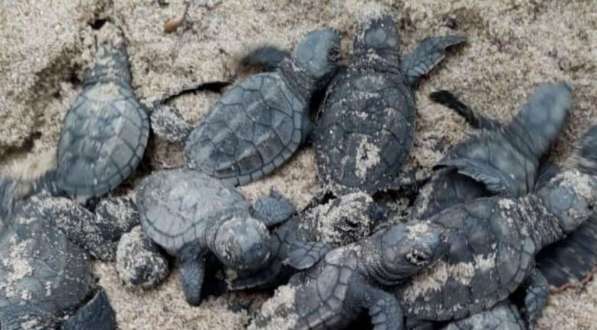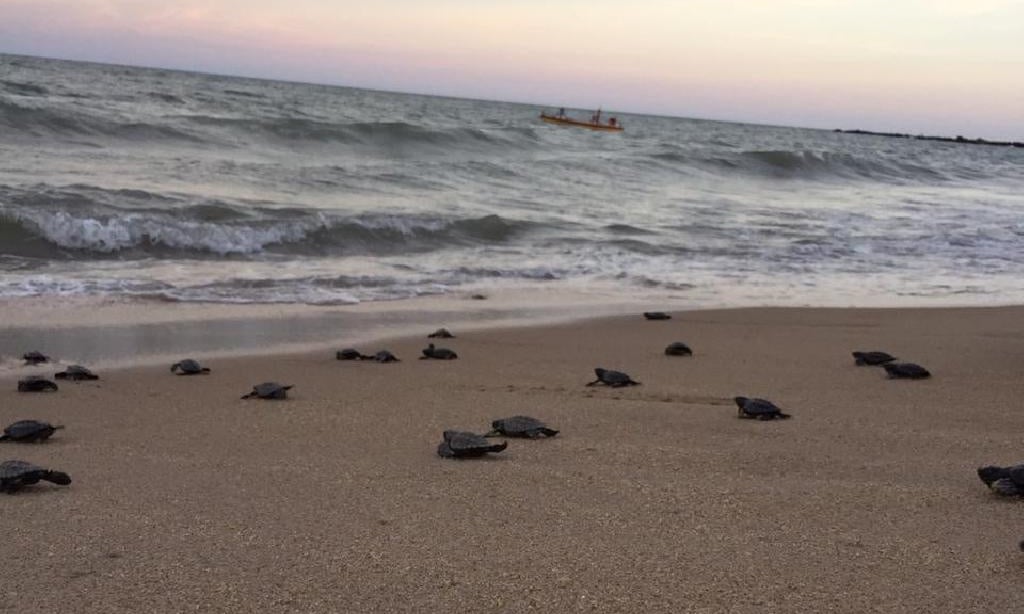Close to 100 hawksbill sea turtles – a critically endangered species – have been found on a deserted beach in Brazil. Barely hatched, their arrival remained unnoticed by passersby, given the recent and strict COVID-19 restrictions prohibiting citizens from accessing the region’s beaches.
Also known as tartarugas-de-pente in Brazil, the 97 sea turtles hatched in Paulista last Sunday – a small town within the northeastern Brazilian state of Pernambuco.
Paulista’s environmental secretary, Roberto Couto, said the town was a regular home five different types of turtles, including hawksbill itself, the green sea turtle, the olive ridley turtle, and the loggerhead turtle. The town has seen over 300 turtles have hatched there this year alone.
Emerging photographs of the tiny newborn hawksbills show them making their way down into the Atlantic waves – a sight only witnessed by Government workers allowed on-premises to document their arrival.

Olive Ridley sea turtles, known as Golfinas in Spanish, (Lepidochelys olivacea) make nests to lay their eggs at Ixtapilla Beach, Michoacan State, Mexico, on July 20, 2018. – Mass arrivals of sea turtles known as “arribadas”, happen every year at Ixtapilla Beach where thousands of turtles arrive to lay their eggs. (Photo by Enrique CASTRO / AFP) (Photo credit should read ENRIQUE CASTRO/AFP via Getty Images)
Locals, on the other hand, have been forbidden from visiting the incredible Pernambuco shoreline since last weekend after a partial shutdown was ordered by the state governor, urging citizens to stay safe and indoors given the growing threat of COVID-19.
Whilst locals missed out on the rare sight, the Governor, Paulo Câmara, continued to emphasize the importance of isolation. “Only isolation will stop the curve growing at the speed it is growing in other places,” he said.
Thousands of olive ridley turtles nesting on the beaches of Odisha.
Their normal predators (humans) are in quarantine.
This season, their numbers will explode in the oceans.
There is a silver lining in this dark cloud after all. pic.twitter.com/l0DMLbGp4l— Dr. Ashley Jacob (@DrAshJac) March 26, 2020
Câmara believed the measures in the Country to date had been actively undermined by the Country’s president, Jair Bolsonaro, leaving Brazil in a precarious position. He believes adhering to the right distancing measures are vital if Brazil was to avoid an escalation of the virus, similar to how it has taken hold in Europe.
Pernambuco has confirmed 68 Covid-19 cases to date, and five deaths attributed to the virus, and is currently doing everything it can to make hospital beds available for incoming patients.
“All of our efforts are now geared towards delaying its proliferation … [so that] when this curve grows, and it will grow, we are as ready as we possibly can be to care for people,” said Câmara.
Brazil’s Tamar conservation project is an ongoing initiative working to protect sea turtles, just like the hawksbills, in the Country. They believe hawksbills are a critically endangered species and often lay their eggs along the Country’s northeastern coast.

They can grow up to 110cms in length and weigh as much as 85kgs – making them a truly remarkable species. The turtles are said to lay their eggs at the start of each year, with hatchlings emerging around April or May.
“It’s really beautiful because you can see the exact instant they come out of the eggs and … watch their little march across the beach,” Couto said. “It’s marvellous. It’s a wonderful, extraordinary feeling.

Unfortunately, COVID-19 restrictions have meant most people were unaware of their magnificent arrival.
“This time, because of coronavirus, we couldn’t even tell people it was happening,” Câmara said.
His state is home to nine million of the total of 209 million population Brazil hosts, meaning extra caution in light of COVID-19 is critical right now.
“Brazil isn’t ready for an exponential growth [in cases], so we need to buy time … so we can put together the infrastructure to treat as many infected people as possible,” he said.
Did you enjoy this article? – SHARE it on Facebook!

